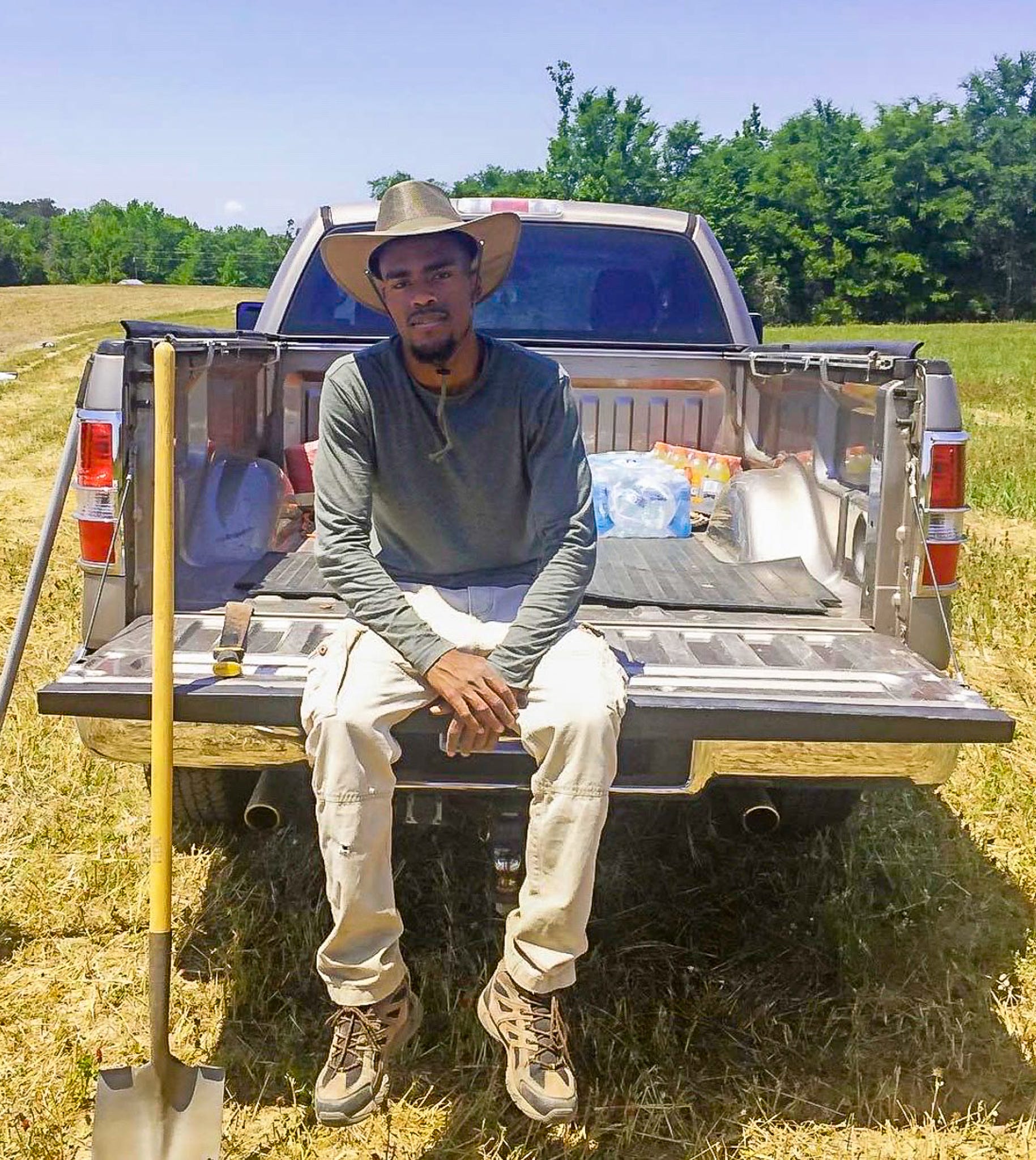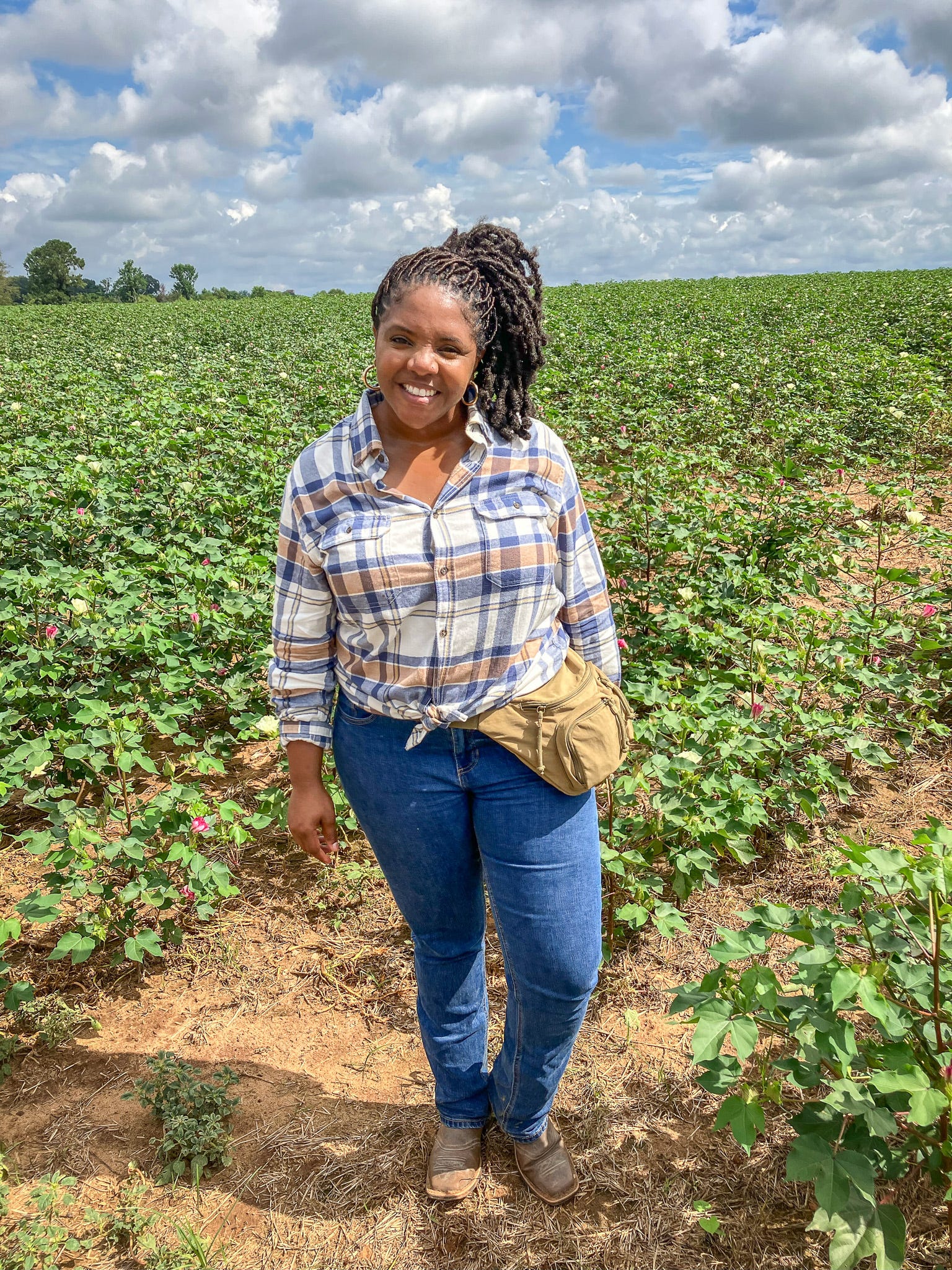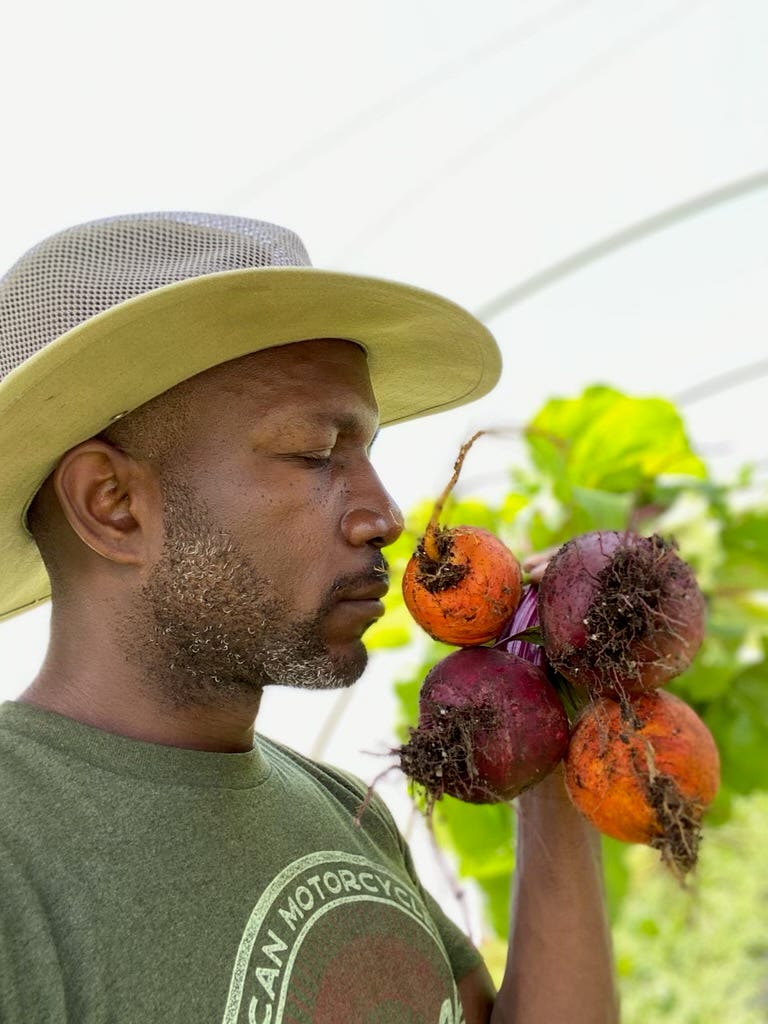There are many ways to farm. And there are many reasons that people farm. Three farmers, a young man from Ohio who returned to fallow family land in Alabama, a fourth-generation female row crop farmer in Mississippi and a Jamaican immigrant growing vegetables in North Carolina, explain in their own words why they farm and what it means to be a Black farmer today in America.
Asaud Frazier: ‘I’m confident in my abilities’
Asaud Frazier grew up in Ohio and has a masters in soil science from Alabama’s Tuskegee University, where George Washington Carver did his pioneering agriculture research. Frazier’s family owned farmland in Wilcox County, Alabama, that was tied up in an heirs dispute and sat fallow for years. The land was originally purchased by Frazier’s ancestors from the white people who had enslaved them. Frazier, 29, returned to that land and has worked to make it productive again.

Asaud Frazier
My family got the land in 1884. Based on my research, I know that a lot of Black people got land at that time.
Despite all the land that was lost, all these many acres, we still have a pretty decent amount of Black land ownership in the Black Belt of Alabama. But if you come to this part of Alabama and see the Black people who got the land, we got the land in the worst areas, whether it was landlocked, swampy, hilly. When we did take the land and make it productive, it was a surprise to everyone.
The land I’m on right now is in a place where the typography is horrible. You’ve got gullies that are hundreds of feet down. It’s hilly. Even these little dirt roads they put in, you’re dealing with erosion. They cut the timber, and they don’t replant. When the new generation comes down here to do some work, it’s harder because now we need excavators, bulldozers and tractors to make the land farmable.
There’s no major highway coming through this county. Even if we start growing food tomorrow, it’d be hard to get our products out of here. There’s no water in certain spots.
I’m 100% confident that it can be made productive. I’m confident in my abilities. I understand how to rebuild the soil. I understand irrigation practices. But we would need a little more help. That’s why I’m not growing food. I’m growing cannabis. And then I can reinvest my money once I make enough and then grow food. But trying to grow food without a tractor and without irrigation, it’s really hard.
There’s definitely an interest with young Black people getting back onto the land. They are tired of these cities. They’re very dangerous nowadays. The hustle and bustle is very stressful. The whole idea that I’m going to work my whole life and may not even own my house, may not have a 401K or a pension is daunting. That is creating the idea of getting back on the land, making it more appealing.
Christi Bland: ‘I grew up on the farm’
Christi Bland, 35, is a fourth-generation farmer. After studying chemistry at Mississippi College and health care at Christian Brothers University in Memphis, she returned to the Mississippi Delta farm with her father. Their large row crop farm spreads across three counties around Sledge, Mississippi.

Christi Bland
I’m a fourth-generation farmer. My great-granddad farmed a couple of hundred acres. Then my granddad farmed a couple of thousand acres. We farm about 1,400 acres, primarily soybeans and rice.
I grew up on the farm, but I spent most of my time either studying or playing basketball competitively. I was on the farm, but I really wasn’t on the farm. My dad was big on education, and he had really good employees. He didn’t really need us as farm labor.
We did a little bit of grunt work, like cleaning out a seed cart or picking up beans that spilled. But I think the hard work ethic is one that stuck with us. I feel guilty for taking a nap during the day, because my dad didn’t nap. When he was up, you were up.
A lot of my granddad’s generation were farmers. But it’s really dwindled down now where we are now in Tunica County. We’re one of the last Black family farms. Historically, they were underserved. If you’re already struggling, it’s hard to want your kids to stay here when they can go other places and make a decent living.
My dad always had side jobs in the winter. That helped him survive in farming. He said the first seven or eight years he farmed, he might as well have been sitting in prison because he made zero dollars.
Historically, Black farmers had the most marginalized land because they had the ability to keep it. Nobody else wanted it. Once they improve it, other people are trying to buy it or find ways they can get it.
I think most people assume farmers are older, white males. And they think of farming as a really dirty job. But now the tractors drive themselves. It’s way more commercialized. It can be stressful when you have trade wars or the river is so low the barges aren’t going down it. It’s a gamble. It takes a really strong person with a lot of faith to be a farmer. From planting to harvest, there are so many variables you can’t control. But it can be fun, and it can be profitable.
Howard Allen: ‘We can make different decisions’
Howard Allen, 45, was born in Jamaica and immigrated with his mother to the United States when he was a child. Today, he runs Faithful Farms in Chapel Hill, North Carolina, where he mentors other Black farmers.

Howard Allen
I was born into farming. I grew up in a rural agrarian town in Jamaica named Troja. My first memory is me and my dad walking the land. And he showed me different trees that he planted for me. It was a custom, he said, that went back to West Africa that when a child was born their parents planted trees that would sustain them throughout their entire lifecycle. I remember him pointing out, “Here’s a coconut tree that I planted when you were born, here’s an avocado tree.”
We were fully sustainable, we had three acres of land, and we had everything there. We lived on a hillside, and 30 yards below the house we had a nice flowing stream. It was just an abundance of citrus, guava, mangoes, breadfruit, avocados and sugar cane. There was always some type of fruit in season. We also raised animals, and those animals ate from the land as well. Our family was one microcosm within the bigger community, so we often traded with our neighbors.
Today I am farming about one acre in Chapel Hill, North Carolina. About three-quarters of an acre has hoop houses, or greenhouses. We wanted to have climate controlled environments where we can provide food for ourselves and our local community year-round. We grow a ton of varieties — lettuces, arugula, peppers, tomatoes, dandelion greens.
I would say Black farmers have approached the farmers market and other distribution points from an equity stance. What I mean is that we’re looking to see how we can be included. When we run into obstacles, it’s easy to say, “Hey, we don’t have fair access.” But why aren’t we building our own distribution channels?
These systems, whether it’s the extension system or the U.S. Department of Agriculture, were designed by whites for whites. Even though under the law we may have a right to those tax dollars and resources, they weren’t designed for us. When we look that truth in the face and accept it, we can make different decisions.
One thing Black farmers have to get back to is cooperative farming. We have to get back to post-slavery, the era of Reconstruction. What were the ancestors doing then? They came together. They raised barns together. They shared tools. They were in a community. I had a glimpse of that growing up in Jamaica.
Do you have stories to share about Black farmers in the South or a response to this story? Email Todd A. Price at taprice@gannett.com.
As told to Todd A. Price of The American South. The interviews were edited for length and clarity.
Uneven Ground: The exceptional stories of the South’s Black farmers
Published
Updated

